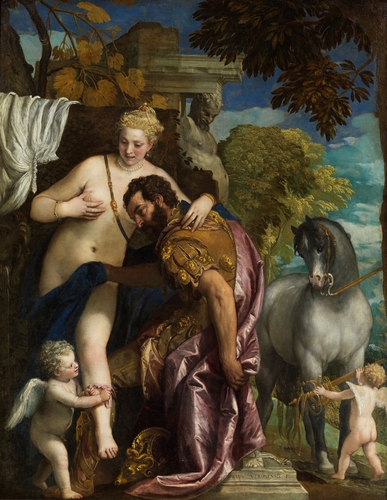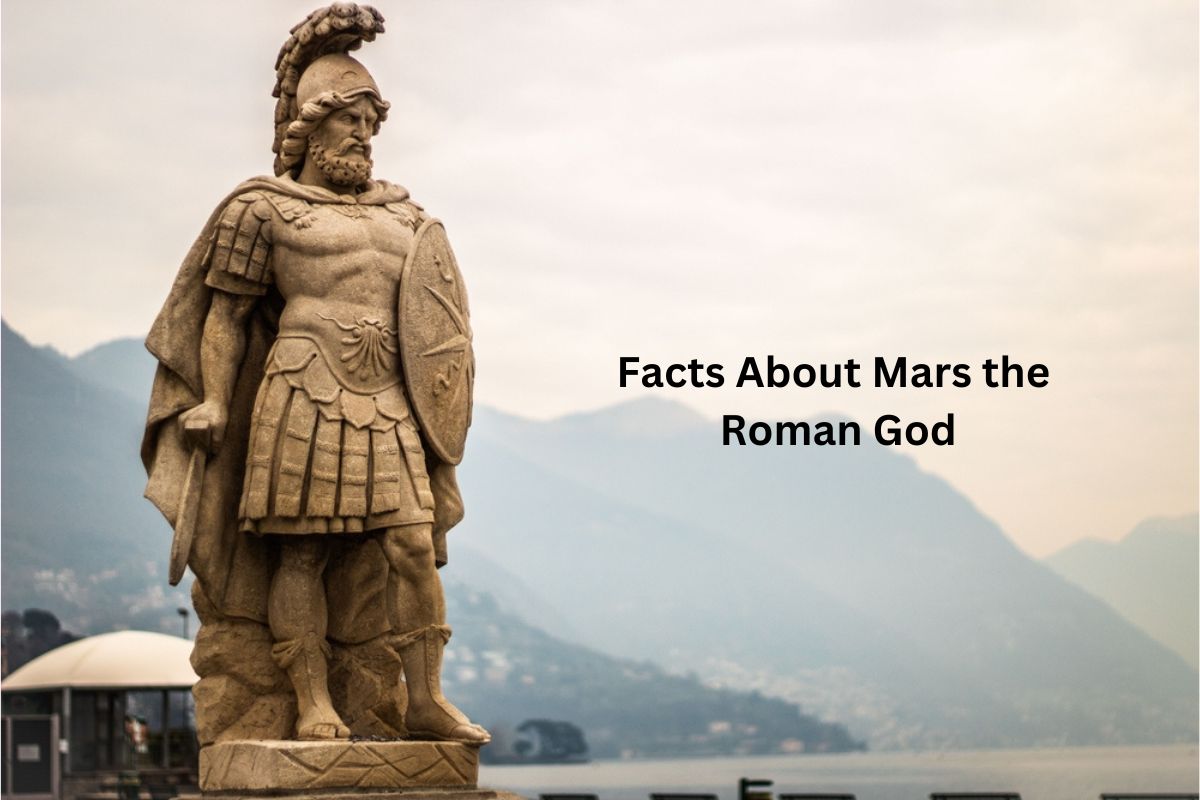Mars, the Roman god, held a prominent place in the ancient Roman pantheon as the god of war. As the equivalent of the Greek god Ares, Mars embodied the fierce and destructive aspects of warfare.
However, Mars was not solely confined to the realm of battle. He was also associated with agriculture, fertility, and the protection of the Roman state.
The son of Jupiter and Juno, Mars played a vital role in Roman mythology and culture, influencing various aspects of Roman life.
From his epithets and festivals to his symbolic connections with the wolf and the woodpecker, Mars left an indelible mark on Roman religion and society.
Roman God Mars Facts
1. Roman god of war
Mars, the Roman god, was primarily known as the god of war. He represented the violent and destructive aspects of warfare and embodied the spirit of conflict, bravery, and victory on the battlefield. He played a crucial role in protecting the Roman state and its people during times of war.
2. Equivalent of the Greek god Ares
In Greek mythology, Ares was the counterpart of Mars. While they shared similar domains and attributes, there were subtle differences in their portrayal.
Also Read: Facts About Neptune the Roman God
Mars was often depicted as a more disciplined and strategic deity, embodying the idealized Roman virtues of discipline, organization, and military prowess.

3. Son of Jupiter and Juno
Mars was considered the son of Jupiter, the king of the gods, and Juno, the queen of the gods. He belonged to the second generation of Roman gods known as the Olympians.
Being the child of such prominent deities elevated Mars’ status and importance within the Roman pantheon. He was revered as a divine figure with considerable power and influence.
Also Read: Venus Goddess Facts
Additionally, Mars was believed to be the father of Romulus and Remus, the legendary twins who were the founders of Rome according to Roman mythology. This connection further solidified his significance in Roman culture and history.
4. Depicted as a powerful warrior
Mars, as the Roman god of war, was commonly depicted as a formidable and powerful warrior in Roman art and mythology. Artists and sculptors often portrayed him as a strong and muscular figure, highlighting his physical prowess and military might.
Mars was typically depicted wearing a plumed helmet, symbolizing his status as a divine warrior, and carrying a spear, which represented his role as a warrior leader.
In many artistic representations, Mars was shown in the midst of battle, either standing triumphantly with his weapon or riding a chariot into the thick of combat. His confident and assertive stance conveyed his fearlessness and unwavering determination in the face of adversity.
The artistic depictions of Mars aimed to capture his commanding presence and evoke a sense of awe and respect for his martial abilities.
5. Associated with agriculture and fertility
While Mars was primarily associated with war, he also held a significant role in agriculture and fertility. Romans believed that Mars not only protected them during times of conflict but also ensured a prosperous and fruitful harvest.
As the god of agriculture, Mars was invoked to bless the fields, promote fertility, and safeguard crops from diseases and pests. This dual aspect of Mars showcased the interconnectedness of warfare and agriculture in Roman society.
6. Month of March is named after him
The month of March was named after Mars in the ancient Roman calendar. March marked the beginning of spring, a time when military campaigns would commence. As the first month of the year in the Roman calendar, it symbolized a fresh start and the awakening of nature.
The naming of March after Mars reinforced his association with the initiation of military activities, reflecting the Roman mindset that war and conquest were integral to their society.
7. Had various epithets, including Mars Gradivus and Mars Quirinus
Mars was referred to by various epithets and titles that highlighted different aspects of his character and domains. One of his notable epithets was Mars Gradivus, which emphasized his role as the god of war and conflict.
The term “Gradivus” derived from the Latin word “gradus,” meaning “steps” or “march.” It signified Mars’ involvement in leading armies and directing military campaigns.
Another epithet associated with Mars was Mars Quirinus. Quirinus was a deified form of Romulus, the legendary founder of Rome. By assuming the title of Mars Quirinus, Mars became closely associated with the Roman state and its origins.
This epithet underscored his role as a protector of Rome and its citizens, further solidifying his position as a patron deity of the city and its empire.

8. Honored with festivals and rituals
Mars was honored through various festivals and rituals throughout the year. One of the significant celebrations dedicated to Mars was the “Festival of Mars” (Feria Marti), which took place on March 1st.
It marked the beginning of the military campaign season and was observed with processions, sacrifices, and martial displays. The festival aimed to seek Mars’ favor and protection for the upcoming wars and military endeavors.
9. Associated with the wolf and the woodpecker
Mars was associated with the wolf and the woodpecker in Roman mythology. The wolf symbolized his protective and predatory nature. It represented Mars’ ability to safeguard and defend the Roman people, much like a wolf protects its pack.
The woodpecker, on the other hand, was believed to be Mars’ sacred bird. It was seen as an embodiment of Mars’ watchful presence and a symbol of his connection to nature and the wilderness.
10. Temple of Mars Ultor built in Rome by Emperor Augustus
The Temple of Mars Ultor (Mars the Avenger) was a significant religious structure built in Rome. It was commissioned by Emperor Augustus in 2 BCE to commemorate his victory over Julius Caesar’s assassins, collectively known as the Liberators.
The temple was dedicated to Mars as the avenger of the Roman people and the Roman state. Mars Ultor represented the divine retribution and justice meted out to those who threatened the stability and integrity of Rome.
Mars’ worship extended beyond Rome and was present in many cities and colonies established by the Romans. Temples dedicated to Mars were built in various regions as a symbol of Roman power and influence.
These temples served as focal points for religious rituals, military ceremonies, and offerings to Mars, emphasizing his role in protecting and expanding the Roman Empire. The presence of Mars’ worship in these settlements showcased the widespread veneration of the god and the integration of Roman religion into different territories.
